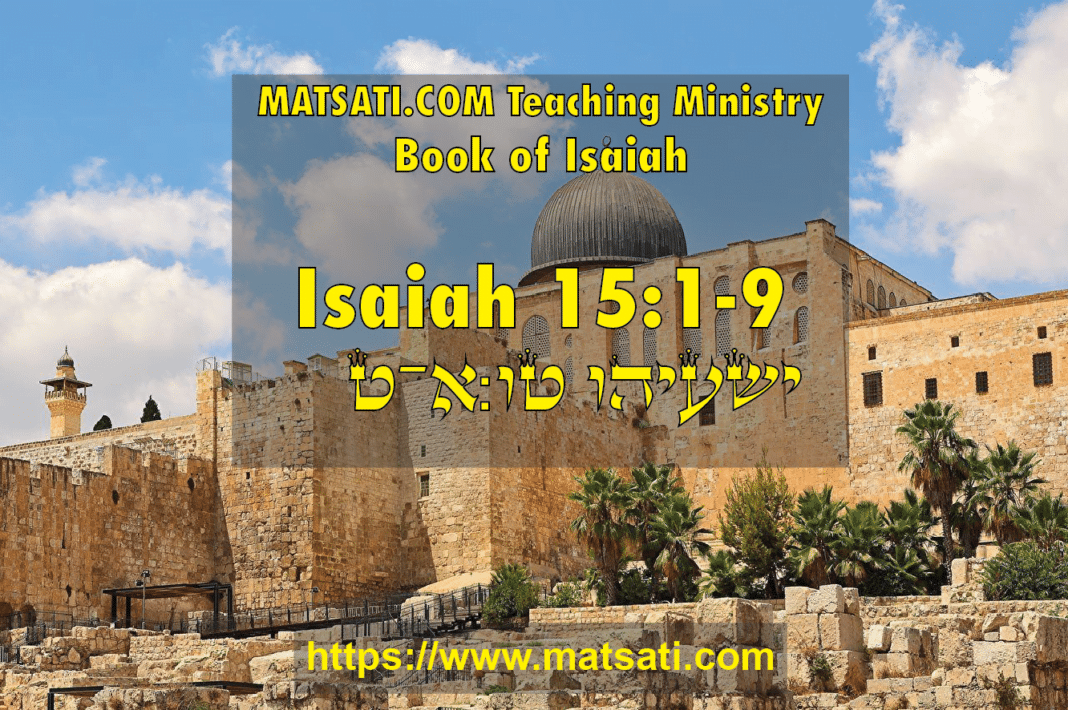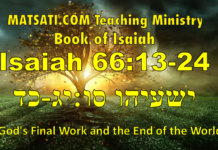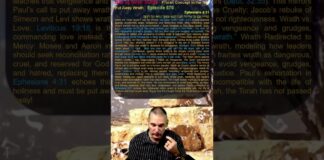Table of Contents
Introduction to Isaiah 15:1-9
Isaiah chapter 15 appears to be an oracle against Moab. MOAB (מוֹאָב, mo’av). The geographical plateau east of the Dead Sea, south of the Arnon River, north of the Zered River, and west of the Arabian Desert. This region is described according to Bamidbar / Numbers 21:10-15.
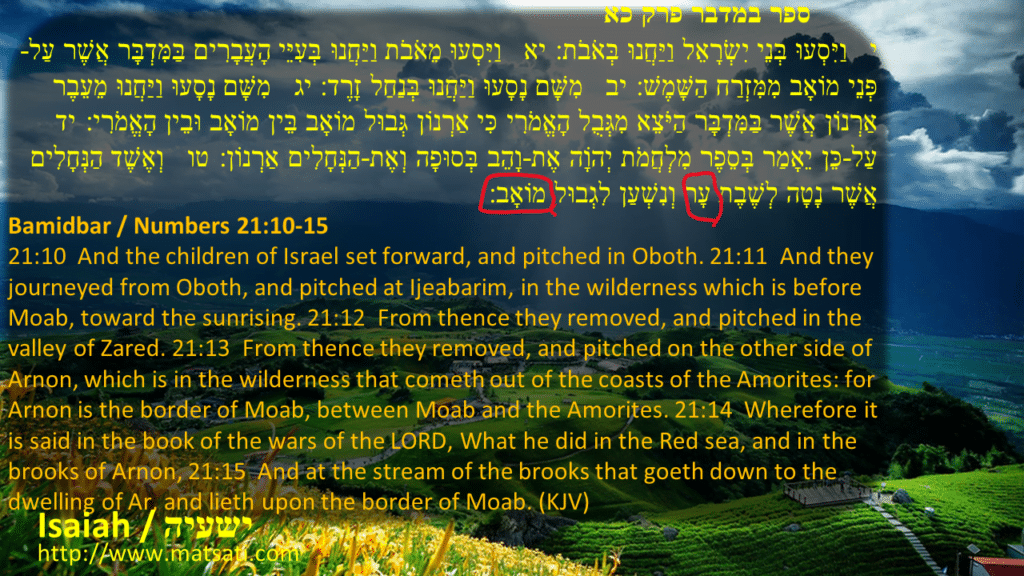
ספר במדבר פרק כא
י וַיִּסְעוּ בְּנֵי יִשְֹרָאֵל וַיַּחֲנוּ בְּאֹבֹת: יא וַיִּסְעוּ מֵאֹבֹת וַיַּחֲנוּ בְּעִיֵּי הָעֲבָרִים בַּמִּדְבָּר אֲשֶׁר עַל-פְּנֵי מוֹאָב מִמִּזְרַח הַשָּׁמֶשׁ: יב מִשָּׁם נָסָעוּ וַיַּחֲנוּ בְּנַחַל זָרֶד: יג מִשָּׁם נָסָעוּ וַיַּחֲנוּ מֵעֵבֶר אַרְנוֹן אֲשֶׁר בַּמִּדְבָּר הַיֹּצֵא מִגְּבֻל הָאֱמֹרִי כִּי אַרְנוֹן גְּבוּל מוֹאָב בֵּין מוֹאָב וּבֵין הָאֱמֹרִי: יד עַל-כֵּן יֵאָמַר בְּסֵפֶר מִלְחֲמֹת יְהוָֹה אֶת-וָהֵב בְּסוּפָה וְאֶת-הַנְּחָלִים אַרְנוֹן: טו וְאֶשֶׁד הַנְּחָלִים אֲשֶׁר נָטָה לְשֶׁבֶת עָר וְנִשְׁעַן לִגְבוּל מוֹאָב:
Bamidbar / Numbers 21:10-15
21:10 And the children of Israel set forward, and pitched in Oboth. 21:11 And they journeyed from Oboth, and pitched at Ijeabarim, in the wilderness which is before Moab, toward the sunrising. 21:12 From thence they removed, and pitched in the valley of Zared. 21:13 From thence they removed, and pitched on the other side of Arnon, which is in the wilderness that cometh out of the coasts of the Amorites: for Arnon is the border of Moab, between Moab and the Amorites. 21:14 Wherefore it is said in the book of the wars of the LORD, What he did in the Red sea, and in the brooks of Arnon, 21:15 And at the stream of the brooks that goeth down to the dwelling of Ar, and lieth upon the border of Moab. (KJV)
This region is to the east side of the Dead Sea and extends from the Arnon River to about 20 miles south of the sea’s north shore, to the Zered River at the southern end of the Dead Sea where the territory of Edom began according to Bamidbar / Numbers 21:10-15. The Torah area of Moab was 30 miles long x 30 miles wide. The origin of Moab is related to the people of Israel through the daughters of Lot. According to Parashat Vayera following the destruction of Sodom and Gomorrah Lot’s daughters got Lot drunk and then had children by their father. Each conceived child and two nations come forth from them, Moab and Ammon. The plains of Moab provide the setting for a lot of the text according to Bamidbar / Numbers 21 to Joshua 3. For example, the Kings of Sihon and Og were defeated in Moab, Bilam attempted to curse the Israelites for Balak, the king of Moab (see Bamidbar / Numbers 21:21-35, 22:1-24:25). Moshe read the Torah to the people and transferred leadership role to Joshua on the plains of Moab as well. According to Judges 3:12-31, Israel was oppressed by Eglon King of Moab. In addition, 2 Kings 3 describes the international relations between Judah, Israel, Edom, and Moab in the 9th century BC. As we continue to read through the Tanakh (OT) we read how David entrusted his parents to the King of Moab while he dealt with Saul’s hostilities. (1 Samuel 22:3-4) Solomon took wives from Moab and then built places of worship for their god Chemosh. This cost him the kingdom (1 Kings 11:1-7, 11:33). The book of Ruth opens in Moab (Ruth 1) and there are poetic and prophetic mentionings of Moab according to Tehillim / Psalms 60:8, Isaiah 15-16, and Jeremiah 48. (Some of this information was taken from The Lexham Bible Dictionary, Bellingham, WA: Lexham Press, 2016). Israel’s relationship with Moab is more on a friendly basis, as we saw with David and his parents, and also in the book of Ruth. There was also tension due to Moab also laying claim to the land north of the Arnon which was given to Reuben and Gad. (Bamidbar / Numbers 32:1-5 and 32:33-38) This was a source of conflict between Israel and Moab as we see according to Bamidbar / Numbers 21:24-30, Judges 3:12-30, 11:22–26, 1 Samuel 14:47, 2 Kings 3:4-27. Isaiah speaks of the utter destruction that God will bring upon Moab according to Isaiah 15:1-9. Chapter 16 appears to be the remnant of people calling for help. (Isaiah 16:1-5). John Oswalt states in his commentary saying, “The language and style of chs. 15 and 16 are often very obscure. This difficulty, coupled with the fact that Jer. 48 duplicates certain portions but in different order and structure, has led many scholars to posit a very complex literary history for the present chapters. However, there is virtually no agreement from one scholar to the next, as Kaiser has shown. Thus, while Hitzig dates the initial ideas and forms to Jonah, Duhm attributed them to a second-century B.C. redactor. At the least, the similarity between the statements in Jeremiah and Isaiah and the fact that they are admittedly reused in Isaiah suggest there may have been a standard poetic treatment of Moab that had entered “the common domain” and was thus drawn upon by both prophets.” The point of all these things we read in the biblical narrative is to have faith, to be faithful, and to trust in the Lord God in heaven. The reason the Lord sends these things upon the nations is due to their sins. Just as we see in the biblical narrative how the devastation appears to come from the north, which is an indication of a Babylonian destruction, God uses armies of godless men to do what is needed to remove wickedness and evil from this world. Especially the peoples who worship false gods, and perform human sacrifice to their gods. This is a warning to those who practice these things today. There may be temporal benefits to the demonic powers (wealth, sex, sins of the flesh) in this world, but the ultimate outcome is destruction, suffering, death, and hell! The Lord God in heaven is allowing a time for repentance! He does this calling all men, women, and children to repent and turn from their evil ways, and seek Him, and His holy and righteous ways!
Isaiah opens Isaiah 15 saying the following:
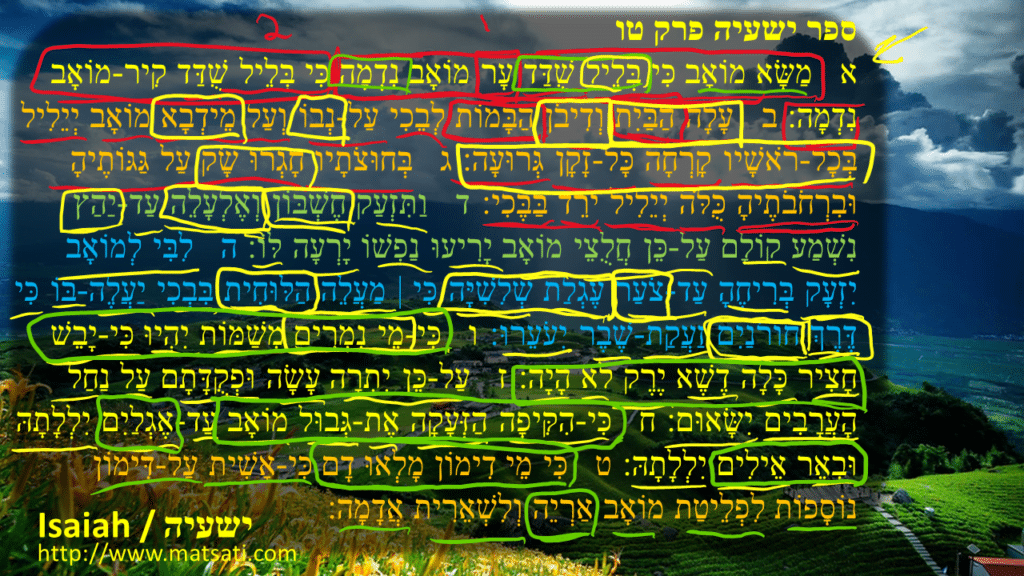
ספר ישעיה פרק טו
א מַשָּׂא מוֹאָב כִּי בְּלֵיל שֻׁדַּד עָר מוֹאָב נִדְמָה כִּי בְּלֵיל שֻׁדַּד קִיר-מוֹאָב נִדְמָה:
Isaiah 15:1 states, “The burden of Moab. (מַשָּׂא מוֹאָב) Because in the night Ar of Moab is laid waste, and brought to silence; because in the night Kir of Moab is laid waste, and brought to silence; (כִּי בְּלֵיל שֻׁדַּד עָר מוֹאָב נִדְמָה כִּי בְּלֵיל שֻׁדַּד קִיר-מוֹאָב נִדְמָה)” Notice the repetition כִּי בְּלֵיל שֻׁדַּד עָר מוֹאָב נִדְמָה כִּי בְּלֵיל שֻׁדַּד קִיר-מוֹאָב נִדְמָה “Because in the night Ar of Moab is laid waste, and brought to silence; because in the night Kir of Moab is laid waste, and brought to silence” is a method of emphasis in the Hebrew text. Look at how Isaiah 15:1 speaks of both Ar and Kir, and the map of Moab.
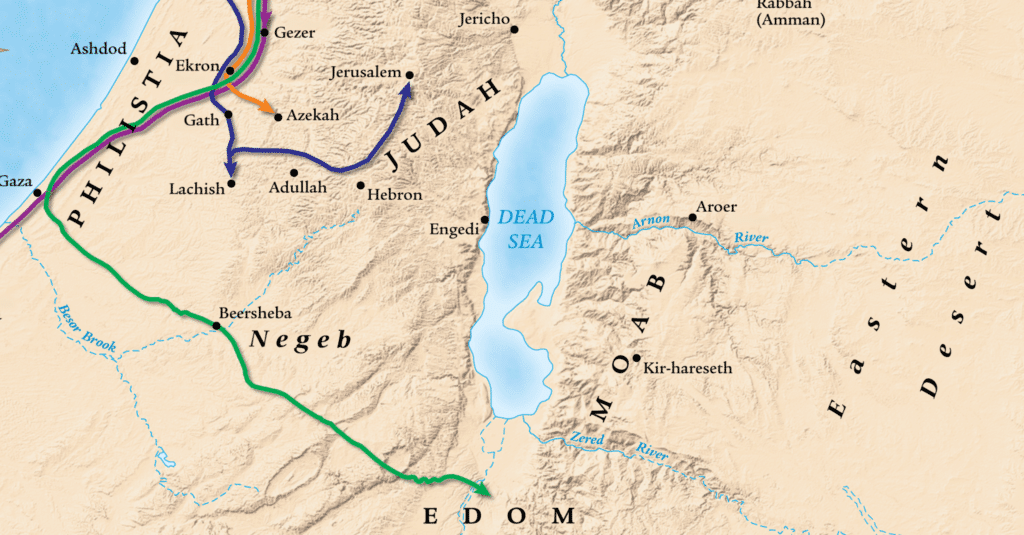
Note how Aroer is north, and Kir is south, this suggests the possible progression of the military forces from above, north to south, and possible Babylonian attack. These words suggest that the destruction was certain based upon the repetition of the text. We note that the only security that we have in this world is by trusting in the Lord God in heaven because if we do not trust in the Lord, we have no basis to guarantee tomorrow! (Amos 6:1-3, Isaiah 5:26-30) Isaiah 15:2-4 describe the lamentation that will be laid upon the people of Moab, a great mourning, and such feelings of hopelessness that even the army of Moab will become weak at the knees to fight.
ספר ישעיה פרק טו
ב עָלָה הַבַּיִת וְדִיבֹן הַבָּמוֹת לְבֶכִי עַל-נְבוֹ וְעַל מֵידְבָא מוֹאָב יְיֵלִיל בְּכָל-רֹאשָׁיו קָרְחָה כָּל-זָקָן גְּרוּעָה: ג בְּחוּצֹתָיו חָגְרוּ שָֹק עַל גַּגּוֹתֶיהָ וּבִרְחֹבֹתֶיהָ כֻּלֹּה יְיֵלִיל יֹרֵד בַּבֶּכִי:
Isaiah 15:2 states, “He is gone up to Bajith, and to Dibon, the high places, to weep: (עָלָה הַבַּיִת וְדִיבֹן הַבָּמוֹת לְבֶכִי) Moab shall howl over Nebo, and over Medeba: (עַל-נְבוֹ וְעַל מֵידְבָא מוֹאָב יְיֵלִיל) on all their heads shall be baldness, and every beard cut off. (בְּכָל-רֹאשָׁיו קָרְחָה כָּל-זָקָן גְּרוּעָה)” Isaiah 15:3 “In their streets they shall gird themselves with sackcloth: (בְּחוּצֹתָיו חָגְרוּ שָֹק) on the tops of their houses, and in their streets, every one shall howl, weeping abundantly. (עַל גַּגּוֹתֶיהָ וּבִרְחֹבֹתֶיהָ כֻּלֹּה יְיֵלִיל יֹרֵד בַּבֶּכִי)” This verse mentions a number of locations.
- BAJITH (בַּיִת) This word means “house” in hebrew, and is a word referring to a temple of Moab, sometimes simply translated as “temple” (Isaiah 15:2 ESV) and other times transliterated (Isaiah 15:2 KJV).
- DIBON (דִּיבוֹן) The capital city of ancient Moab, mentioned several times in the Hebrew Bible (Bamidbar / Numbers 21:30, 32:3, 32:34, Joshua 13:9, 13:17, Nehemiah 11:25, Isaiah 15:2, Jeremiah 48:18-22). The ancient city of Dibon has been identified with the mound of ruins located north of the modern village of Dhiban, approximately 40 miles south of Amman. Eusebius (260–ca. 339 bc) described Dibon as “a large town near the Arnon” (Eusebius, Onomasticon). The Arab geographer Yaqut (ad 1179–1229) also mentioned “the lowest peaks of the village Dhiban” (cited in Tushingham, “Dibon,” 330, 332). The biblical account demonstrates that the Israelites had a strained relationship with the Moabites, who were descendants of Lot (Bereshit / Genesis 19:36–37, Bamidbar / Numbers 22–24). Bamidbar / Numbers 21:26–30 records that shortly after the Amorite king Sihon defeated the Moabites and conquered Dibon, the Israelites asked Sihon for permission to travel through his territory. Sihon refused and instead attacked the Israelites. With God’s help, the Israelites succeeded in defeating Sihon and capturing Dibon. The territory of Dibon was later allocated to the tribes of Gad (Bamidbar / Numbers 32:34) and Reuben (Joshua 13:15).
- NEBO OF JUDAH (נְבוֹ) The references to Nebo in the books of Ezra and Nehemiah could refer to a place in Judah settled by people who returned from the exile in Babylon (Ezra 2:29, 10:43, Nehemiah 7:33). Many of the names found in Ezra 2:20–35 are also place names which could indicate the name of the villages where they settled. Alternatively, people may have taken the name of a place where they lived in exile as a family name or personal name (see Elam, Ancestor of a Family of Returned Exiles). There was also a place called Nebo in the Transjordan (Bamidbar / Numbers 32:3, 3:38, Jeremiah 48:1, 48:22). The only indication that a place named Nebo may have existed in Judah comes from these references to a “Nebo” among other names that are also place names from territory occupied by the tribes of Israel and Judah (Ezra 2:29, 10:43, Nehemiah 7:33).
- MEDEBA (מֵידְבָא) A city located on the Moabite plains that the Israelites conquered and settled prior to entering the land of Canaan (Bamidbar / Numbers 21:30). The town of Medeba can be identified with the modern city of Madaba, which is located about 19 miles south of Amman on the plains of the Central Jordan Plateau.
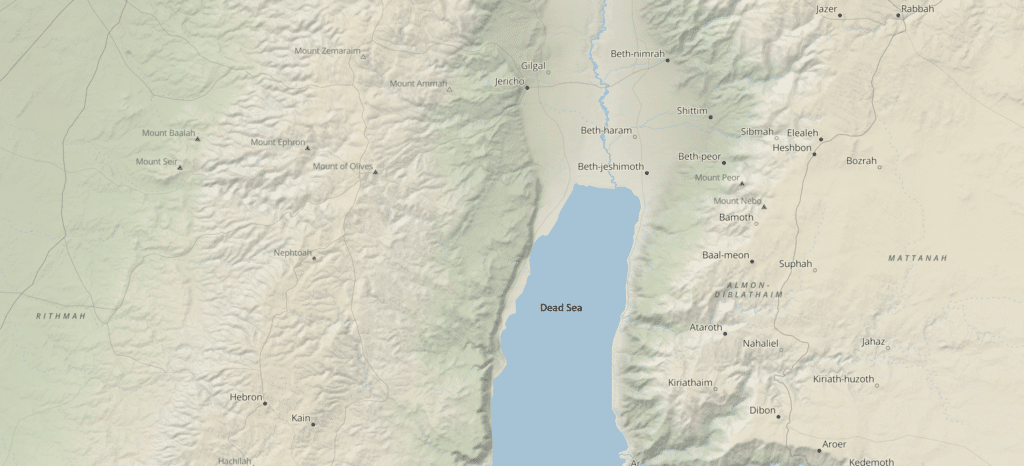
In Isaiah 15:2, עָלָה הַבַּיִת “ascending to the house” the transliteration of the word as Bajith is a but deceptive. Here the house may refer to a high place where Moab was accustomed to worshiping, or to a temple of their god in order to cry out to their god for help. It was at Dibon where the Moabite god Chemosh was located, the abomination of Moab, the place where they sacrificed children to their god, evil. We note according to the Scriptures, their god was unable to deliver them and so they lamented over their gods inability to save them. (see Jeremiah 48:35) Remember Mount Nebo from the Torah, how God showed Moshe Israel by his going up the mountain. Medeba is located 5 miles southeast of Nebo. The idea of בְּכָל-רֹאשָׁיו קָרְחָה כָּל-זָקָן גְּרוּעָה “on all their heads shall be baldness, and every beard cut off” is indicative of great shame. Remember what happened to King David’s servants according to 2 Samuel 10:4 “So Hanun seized David’s envoys, shaved off half of each man’s beard, cut off their garments at the buttocks, and sent them away.” This cutting of the beard, just like the wearing of sackcloth (Isaiah 15:3) was a sign of mourning. (see Isaiah 22:12, 2 Samuel 3:31, Jeremiah 4:8, 41:5, and Lamentations 2:10) Isaiah goes on saying the following:
ספר ישעיה פרק טו
ד וַתִּזְעַק חֶשְׁבּוֹן וְאֶלְעָלֵה עַד-יַהַץ נִשְׁמַע קוֹלָם עַל-כֵּן חֲלֻצֵי מוֹאָב יָרִיעוּ נַפְשׁוֹ יָרְעָה לּוֹ:
Isaiah 15:4 states, “And Heshbon shall cry, and Elealeh: their voice shall be heard even unto Jahaz: (וַתִּזְעַק חֶשְׁבּוֹן וְאֶלְעָלֵה עַד-יַהַץ נִשְׁמַע קוֹלָם) therefore the armed soldiers of Moab shall cry out; his life shall be grievous unto him. (עַל-כֵּן חֲלֻצֵי מוֹאָב יָרִיעוּ נַפְשׁוֹ יָרְעָה לּוֹ)” Here Isaiah points out the hopelessness of the armed soldiers against the God of Israel who brings destruction. There are three cities mentioned, Heshbon, Elealeh, and Jahaz:
- HESHBON (הֶשְׁבּוֹן, Greek Εσβους, Esbous) A city of Moab is mentioned 38 times in the Old Testament. Heshbon was located along the King’s Highway, the primary north-south trade road through the Transjordan region (Younker, “Hesban,” 59). The first reference to Heshbon describes it as the capital city of Sihon, king of the Amorites—the first king defeated by the Israelites in the Transjordan region (Bamidbar / Numbers 21:21–26). The text indicates that Heshbon had only recently been captured by Sihon, who had deposed the “former king of Moab and taken all his land” (Bamidbar / Numbers 21:26 ESV). After the Israelites defeated Sihon, they inhabited Heshbon and the surrounding area (Bamidbar / Numbers 21:25). Later, Sihon’s territory was divided between the tribes of Reuben and Gad, with Heshbon apparently assigned to Reuben (Joshua 13:15–17, 24–27). Several prophets refer to Heshbon within oracles against Moab (Isaiah 15:4, 16:8–9, Jeremiah 48:2, 48:34, 48:45). It also is mentioned in an oracle against Ammon (Jeremiah 49:3)—which suggests that the Ammonites seized control of Heshbon from the Moabites sometime during the Iron II period.
- ELEALEH (אֶלְעָלֵא) A town rebuilt by the Reubenites when they claimed territory in the Transjordan (Bamidbar / Num 32:3, 32:37). It is mentioned with Heshbon in Isaiah’s and Jeremiah’s oracles (Isaiah 15:4, 16:9, Jeremiah 48:34).
- JAHAZ (יַהַץ / יַהְצָה) An Amorite site conquered by the Israelites under Moses that was later designated as a Levitical city. Also appears in prophetic oracles against Moab (Isaiah 15:4, Jeremiah 48:21, 48:34). King Sihon of the Amorites engaged the Israelite army in battle at Jahaz after he denied their request to pass through his land. After defeating Sihon, Israel appropriated the territory of the Amorites, which presumably included Jahaz (Bamidbar / Numbers 21:21–31, compare Judges 11:18–23). Deuteronomy adds that Israel destroyed (literally “banned,” וַנַּחֲרֵם, wannacharem) every Amorite city with all of its inhabitants (Devarim / Deuteronomy 2:34). In apportioning the land, Joshua allotted Jahaz to the Reubenites (Joshua 13:18) but later designated it as a Levitical city (Joshua 21:36, 1 Chronicles 6:78, but see Joshua 21:36 LXX: Ιαζηρ, Iazēr). From the scant evidence available concerning Israel’s influence over northern Moab in the following centuries, it appears that Israel held Jahaz only periodically. The Mesha Stele indicates that by the early ninth century Omri conquered Jahaz, and it remained in his possession through the end of Ahab’s reign. After the death of Ahab (ca. 852 bc), King Mesha of Moab revolted against Israel, etc.
These cities, Heshbon and Elealeh, were contested between Israel and Moab. These cities are two miles apart from one another. Jahaz is south further approximately 10-12 miles away from Heshbon. The idea is that these cities are so close that עַל-כֵּן חֲלֻצֵי מוֹאָב יָרִיעוּ “all the soldiers crying out” could essentially be heard among these cities. In the next few verses, Isaiah begins talking about the refugees that result from this war.
ספר ישעיה פרק טו
ה לִבִּי לְמוֹאָב יִזְעָק בְּרִיחֶהָ עַד-צֹעַר עֶגְלַת שְׁלִשִׁיָּה כִּי | מַעֲלֵה הַלּוּחִית בִּבְכִי יַעֲלֶה-בּוֹ כִּי דֶּרֶךְ חוֹרֹנַיִם זַעֲקַת-שֶׁבֶר יְעֹעֵרוּ:
Isaiah 15:5 states, “My heart shall cry out for Moab; his fugitives shall flee unto Zoar, (לִבִּי לְמוֹאָב יִזְעָק בְּרִיחֶהָ עַד-צֹעַר) an heifer of three years old: for by the mounting up of Luhith with weeping shall they go it up; (עֶגְלַת שְׁלִשִׁיָּה כִּי | מַעֲלֵה הַלּוּחִית בִּבְכִי יַעֲלֶה-בּוֹ) for in the way of Horonaim they shall raise up a cry of destruction. (כִּי דֶּרֶךְ חוֹרֹנַיִם זַעֲקַת-שֶׁבֶר יְעֹעֵרוּ)” Zoar reminds us of one of five “cities of the plain” where Lot took refuge during the destruction of Sodom and Gomorrah.
- ZOAR (צוֹעַר, צָעִיר, בֶּלַע) One of five cities of the plain. The city to which Lot escaped during the destruction of Sodom and Gomorrah (Bereshit / Genesis 19:22, 23). Formerly called Bela (Bereshit / Genesis 14:2-8) and also referred to by Isaiah and Jeremiah (Isaiah 15:5, Jeremiah 48:34).
Zoar is located at the bottom end of the Dead Sea near Sodom and Gomorrah in the territory of Edom. The phrase עֶגְלַת שְׁלִשִׁיָּה is translated “heifer of three years” and מַעֲלֵה הַלּוּחִית בִּבְכִי “ascending the stairs weeping” this appears again to be a form of going up, ascending to their god to weep over their destruction. Horonaim is a theophoric name (for the god Horon) like Beth-Horon in western Ereẓ Israel. The biblical descriptions “going down of Horonaim” and “the way of Horonaim” indicate that the town dominated an important road, probably the ascent from the southern end of the Dead Sea. These people walk in the way of their gods even in the midst of their destruction. These things illustrate for us the power of tradition and the way in which we were raised up. Tradition has great power, and it is only by a miracle of God by which one who was raised in a pagan way to break free. This is illustrated in these things that are taking place here in Isaiah’s prophecy against Moab.
ספר ישעיה פרק טו
ו כִּי-מֵי נִמְרִים מְשַׁמּוֹת יִהְיוּ כִּי-יָבֵשׁ חָצִיר כָּלָה דֶשֶׁא יֶרֶק לֹא הָיָה: ז עַל-כֵּן יִתְרָה עָשָֹה וּפְקֻדָּתָם עַל נַחַל הָעֲרָבִים יִשָּׂאוּם: ח כִּי-הִקִּיפָה הַזְּעָקָה אֶת-גְּבוּל מוֹאָב עַד-אֶגְלַיִם יִלְלָתָהּ וּבְאֵר אֵילִים יִלְלָתָהּ:
Isaiah 15:6 states, “For the waters of Nimrim shall be desolate: (כִּי-מֵי נִמְרִים מְשַׁמּוֹת יִהְיוּ) for the hay is withered away, the grass faileth, there is no green thing. (כִּי-יָבֵשׁ חָצִיר כָּלָה דֶשֶׁא יֶרֶק לֹא הָיָה)” Isaiah 15:7 “Therefore the abundance they have gotten, and that which they have laid up, shall they carry away to the brook of the willows. (עַל-כֵּן יִתְרָה עָשָֹה וּפְקֻדָּתָם עַל נַחַל הָעֲרָבִים יִשָּׂאוּם)” Isaiah 15:8 “For the cry is gone round about the borders of Moab; (כִּי-הִקִּיפָה הַזְּעָקָה אֶת-גְּבוּל מוֹאָב) the howling thereof unto Eglaim, and the howling thereof unto Beerelim. (עַד-אֶגְלַיִם יִלְלָתָהּ וּבְאֵר אֵילִים יִלְלָתָהּ)”
- WATERS OF NIMRIM (מֵי־נִמְרִים) Waters in Moab that Isaiah and Jeremiah denounced (Isaiah 15:6, Jeremiah 48:34). Because Isaiah associates these waters with Zoar and Horonaim, both of which are located on the south end of the Dead Sea, most scholars prefer to identify the Waters of Nimrim with the once fertile land southeast of the Sea, the modern Wadi Nemeirah.
- EGLAIM (אֶגְלַיִם) A village in the south of Moab, which is mentioned in Isaiah’s oracle against Moab (Isaiah 15:8).
- BEER-ELIM (בְּאֵר אֵלִים) Area located north of Moab and connected to Eglaim (Isaiah 15:8); also known as the Well of Elim.
This phrase כִּי-מֵי נִמְרִים מְשַׁמּוֹת יִהְיוּ “for the waters of Nimrim shall be desolate” is suggestive that these waters will have no property of bringing or sustaining life in the region. This illustrated by the second half of the scripture stating, כִּי-יָבֵשׁ חָצִיר כָּלָה דֶשֶׁא יֶרֶק לֹא הָיָה “for the hay is withered away, the grass faileth, there is no green thing.” Isaiah states that in Isaiah 15:7, the abundance that was laid up will be carried away. This is always possible with any sort of earthly treasures that one stores and especially with the idea that we can’t take it with us when we die. This taken from a literal understanding of the meaning of the devastation of the waters. This may also be figurative from the sense of the devastation of the land through war. We note something about what Yeshua said according to Matthew 6:25-33:
Matthew 6:25-33
6:25 “Therefore I tell you, do not worry about your life, what you will eat or drink; or about your body, what you will wear. Is not life more than food, and the body more than clothes? 6:26 Look at the birds of the air; they do not sow or reap or store away in barns, and yet your heavenly Father feeds them. Are you not much more valuable than they? 6:27 Can any one of you by worrying add a single hour to your life? 6:28 “And why do you worry about clothes? See how the flowers of the field grow. They do not labor or spin. 6:29 Yet I tell you that not even Solomon in all his splendor was dressed like one of these. 6:30 If that is how God clothes the grass of the field, which is here today and tomorrow is thrown into the fire, will he not much more clothe you-you of little faith? 6:31 So do not worry, saying, ‘What shall we eat?’ or ‘What shall we drink?’ or ‘What shall we wear?’ 6:32 For the pagans run after all these things, and your heavenly Father knows that you need them. 6:33 But seek first his kingdom and his righteousness, and all these things will be given to you as well.
This does not mean that we should not prepare for the future to take care of our family. Yeshua is speaking of the immediacy of the events that are taking place in the present day, such as the context of Matthew 6 which speaks of giving to the poor, prayer, fasting, and storing treasures in heaven as opposed to storing them on this earth. Preparation can actually come in a number of approaches, such as not trusting in God but in the materials that have been prepared. The point is that if the Lord has laid on one’s heart to prepare to take care of family etc, then it becomes a matter of faith and a matter of the Lord using what we have been faithful to prepare for such as in helping others. The Lord is able to work a miracle in any way He chooses, and many times it is through the hand of men, women, and children and their faithfulness. So when preparation is made and God is leading and motivating one to do so, this is trusting in the Lord God in heaven in the midst of preparation, that He will get us through the worst of times! These conclusions fall in line with the Peshat of the narrative from Isaiah. Isaiah here speaks of refugees who are crying, as כִּי-הִקִּיפָה הַזְּעָקָה אֶת-גְּבוּל מוֹאָב “For the cry is gone round about the borders of Moab” as war drives families from their homes due to their unrepentant sin.
ספר ישעיה פרק טו
ט כִּי מֵי דִימוֹן מָלְאוּ דָם כִּי-אָשִׁית עַל-דִּימוֹן נוֹסָפוֹת לִפְלֵיטַת מוֹאָב אַרְיֵה וְלִשְׁאֵרִית אֲדָמָה:
Isaiah 15:9 states, “For the waters of Dimon shall be full of blood: (כִּי מֵי דִימוֹן מָלְאוּ דָם) for I will bring more upon Dimon, (כִּי-אָשִׁית עַל-דִּימוֹן) lions upon him that escapeth of Moab, and upon the remnant of the land. (נוֹסָפוֹת לִפְלֵיטַת מוֹאָב אַרְיֵה וְלִשְׁאֵרִית אֲדָמָה)”
- DIMON (דִּימוֹן, dimon) Also Dibon. A Moabite city near the Arnon river (Isaiah 15:9).
This phrase כִּי מֵי דִימוֹן מָלְאוּ דָם “for the waters of Dimon will be fill of blood” suggests that their fleeing did not save them. We note how all the times that David fled, the Lord God of Israel had his back taking care of him, so he was successful. The people of Moab, their god can do nothing and so blood is spilled into the waters of Moab. Note that for those who do escape with their lives the Lord says, כִּי-אָשִׁית עַל-דִּימוֹן נוֹסָפוֹת לִפְלֵיטַת מוֹאָב אַרְיֵה וְלִשְׁאֵרִית אֲדָמָה that He will send a lion, essentially saying that he will send one to hunt them down and kill them. This reminds us of what is written according to Amos 5:18-20.
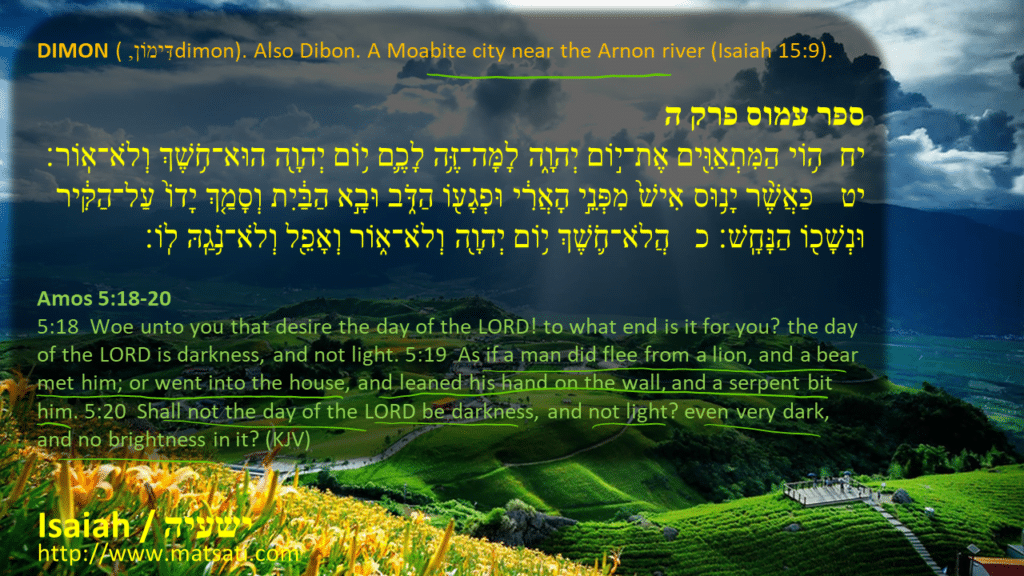
ספר עמוס פרק ה
יח ה֥וֹי הַמִּתְאַוִּ֖ים אֶת־י֣וֹם יְהוָ֑ה לָמָּה־זֶּ֥ה לָכֶ֛ם י֥וֹם יְהוָ֖ה הוּא־חֹ֥שֶׁךְ וְלֹא־אֽוֹר׃ יט כַּאֲשֶׁ֨ר יָנ֥וּס אִישׁ֙ מִפְּנֵ֣י הָאֲרִ֔י וּפְגָע֖וֹ הַדֹּ֑ב וּבָ֣א הַבַּ֔יִת וְסָמַ֤ךְ יָדוֹ֙ עַל־הַקִּ֔יר וּנְשָׁכ֖וֹ הַנָּחָֽשׁ׃ כ הֲלֹא־חֹ֛שֶׁךְ י֥וֹם יְהוָ֖ה וְלֹא־א֑וֹר וְאָפֵ֖ל וְלֹא־נֹ֥גַֽהּ לֽוֹ׃
Amos 5:18-20
5:18 Woe unto you that desire the day of the LORD! to what end is it for you? the day of the LORD is darkness, and not light. 5:19 As if a man did flee from a lion, and a bear met him; or went into the house, and leaned his hand on the wall, and a serpent bit him. 5:20 Shall not the day of the LORD be darkness, and not light? even very dark, and no brightness in it? (KJV)
Note that many of us await the great day of the Lord so that justice will be brought upon this world for its corruption, murders, lies, and propagation of sin. The prophet Amos speaks to the great day of the Lord saying, לָמָּה־זֶּ֥ה לָכֶ֛ם י֥וֹם יְהוָ֖ה הוּא־חֹ֥שֶׁךְ וְלֹא־אֽוֹר “to what end is it for you? the day of the LORD is darkness, and not light.” The idea is that the Day of the Lord will be a very heavy day, and not a day of pleasure. The prophet Isaiah is saying that running away from sin does not work, the Lord will strike across vast distances, even to the most remote locations on the earth, to remove sin, and to draw men back to repentance. The lion demonstrates that there is no mercy regardless of our own efforts to save ourselves, we must turn to the Lord God in heaven, and seek forgiveness in the name of His Son Yeshua. Trusting in the Lord is foundational to being delivered. This is how Moshe wrote according to Shemot / Exodus 14:13 saying stand still and see the YESHUA (salvation, יְשׁוּעַ֣ת ) of the Lord who will fight for you. ( וַיֹּאמֶר מֹשֶׁה אֶל־הָעָם֮ אַל־תִּירָאוּ֒ הִֽתְיַצְב֗וּ וּרְאוּ֙ אֶת־יְשׁוּעַ֣ת יְהוָ֔ה אֲשֶׁר־יַעֲשֶׂה לָכֶ֖ם הַיּ֑וֹם כִּי אֲשֶׁר רְאִיתֶ֤ם אֶת־מִצְרַ֙יִם֙ הַיּ֔וֹם לֹ֥א תֹסִ֛יפוּ לִרְאֹתָ֥ם ע֖וֹד עַד־עוֹלָֽם׃)
Rabbinic Commentary on Isaiah 15:1-9
The Targum Jonathan is an Aramaic and Rabbinic Translation of the book of Isaiah and is valuable for our study of the book of Isaiah.
תרגום יונתן בן עוזיאל אל ישעיה פרק טו:א-ט
א מַטַל כָס דִלוָט לְאַשקָאָה יָת מֹואָב אְרֵי בְלֵיליָא אִתבְזֵיזַת לְחָייַת מֹואָב וְאִינוּן דְמִיכִין וּבלֵיליָא אִתכְבֵיש כַרכָא דְמֹואָב וְאִינוּן רְדִימִין׃ ב סַקוּ לְבָתַיָא דְדִיבֹון לְבָמָתָא לְמִבכֵי עַל נְבֹו וְעַל מֵידְבָא מֹואְבָאֵי מְיַלְלִין בְכָל רֵישֵיהֹון מְרַט כָל דְקַן גִילוּח׃ ג בְשוּקֵיהֹון יֵיסְרוּן שַׂקִין עַל אִיגָרֵיהֹון וּבִרחֹובֵיהֹון כֻלְהֹון מְיַלְלִין מַצוְחִין וּבָכַן׃ ד וּצוַחוּ יָתְבֵי חַשבֹון וְאַלעָלה עַד יַהַץ אִשתְמַע קָלְהֹון עַל כֵין מְזָרְזֵי מֹואָב מַצוְחִין עַל נַפשְהֹון מְיַלְלִין׃ ה בְלִיבְהֹון מֹואְבָאֵי יֵימְרוּן לְמִערַק עַד צֹעַר עַגלַת תַלתֹום רַבְתָא אְרֵי מַסֵיקִית לוּחִית כִיד בָכַן יִסְקוּן בֵיה אְרֵי בְמַחֹותִית חֹורֹונַיִם צִוחַת תְבִירֵי קְרָב יְבַסְרוּן׃ ו אְרֵי מֵי נִמרִים לְצָדוּ יְהֹון אְרֵי יְבֵיש עִסבָא סָף דִתאָה יָרֹוק לָא הְוָה׃ ז עַל כֵין שְאָר נִכסֵיהֹון דִקנֹו יִתבָזְזוּן וּתחוּמְהֹון עַל יַמָא מַערְבָאָה יִתנְסֵיב מִינְהֹון׃ ח אְרֵי אַקֵיפַת צְוַחתָא יָת תְחוּם מֹואָב עַד אַגלַיִם מְיַלְלִין וּבאֵר אֵילִים מַצוְחִין׃ ט אְרֵי מֵי דִימֹון אִתמְלִיאוּ דַם קְטִילִין אְרֵי אְמַנֵי עַל דִימֹון כִנֵישַת מַשרְייָן לְשֵיזָבַת מֹואָב מַלַך בְמַשרְיָתֵיה יִסַק לְמִבַז שְאָרָא דַאְרַעהֹון׃
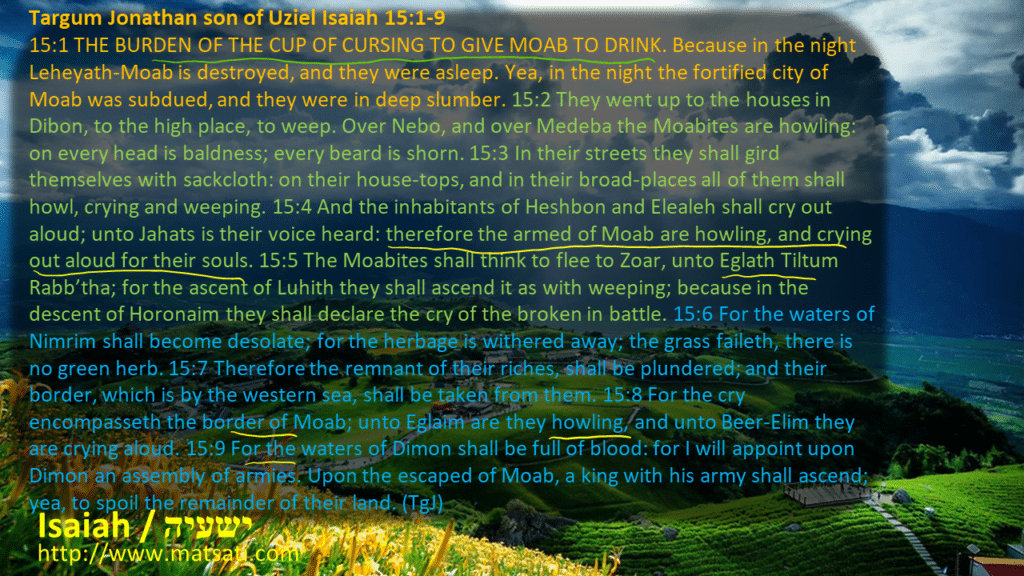
Targum Jonathan son of Uziel Isaiah 15:1-9
15:1 THE BURDEN OF THE CUP OF CURSING TO GIVE MOAB TO DRINK. Because in the night Leheyath-Moab is destroyed, and they were asleep. Yea, in the night the fortified city of Moab was subdued, and they were in deep slumber. 15:2 They went up to the houses in Dibon, to the high place, to weep. Over Nebo, and over Medeba the Moabites are howling: on every head is baldness; every beard is shorn. 15:3 In their streets they shall gird themselves with sackcloth: on their house-tops, and in their broad-places all of them shall howl, crying and weeping. 15:4 And the inhabitants of Heshbon and Elealeh shall cry out aloud; unto Jahats is their voice heard: therefore the armed of Moab are howling, and crying out aloud for their souls. 15:5 The Moabites shall think to flee to Zoar, unto Eglath Tiltum Rabb’tha; for the ascent of Luhith they shall ascend it as with weeping; because in the descent of Horonaim they shall declare the cry of the broken in battle. 15:6 For the waters of Nimrim shall become desolate; for the herbage is withered away; the grass faileth, there is no green herb. 15:7 Therefore the remnant of their riches, shall be plundered; and their border, which is by the western sea, shall be taken from them. 15:8 For the cry encompasseth the border of Moab; unto Eglaim are they howling, and unto Beer-Elim they are crying aloud. 15:9 For the waters of Dimon shall be full of blood: for I will appoint upon Dimon an assembly of armies. Upon the escaped of Moab, a king with his army shall ascend; yea, to spoil the remainder of their land. (TgJ)
Isaiah 15:1 states, א מַשָּׂא מוֹאָב כִּי בְּלֵיל שֻׁדַּד עָר מוֹאָב נִדְמָה כִּי בְּלֵיל שֻׁדַּד קִיר-מוֹאָב נִדְמָה: “The burden of Moab. Because in the night Ar of Moab is laid waste, and brought to silence; because in the night Kir of Moab is laid waste, and brought to silence.” Notice how Isaiah says the destruction comes at a moment that is unexpected, during the night time. The TgJ states, א מַטַל כָס דִלוָט לְאַשקָאָה יָת מֹואָב אְרֵי בְלֵיליָא אִתבְזֵיזַת לְחָייַת מֹואָב וְאִינוּן דְמִיכִין וּבלֵיליָא אִתכְבֵיש כַרכָא דְמֹואָב וְאִינוּן רְדִימִין׃ 15:1 THE BURDEN OF THE CUP OF CURSING TO GIVE MOAB TO DRINK. Because in the night Leheyath-Moab is destroyed, and they were asleep. Yea, in the night the fortified city of Moab was subdued, and they were in deep slumber. (TgJ) מַשָּׂא מוֹאָב the burden of Moab, the word for burden is מַשָּׂא meaning “pronouncement” and is from נשא meaning “to carry, to life, lift up, to raise, to bring, to take or take away.” This has the connotation of carrying something due to their sins. The rabbinic interpretation is as being given a cup of cursing. This parallels what we read in Isaiah 13:1 against Babylon, “THE BURDEN OF THE CUP OF CURSING TO GIVE TO BABYLON TO DRINK, WHICH ISAIAH THE SON OF AMOZ DID PROPHESY.” These things describe the nature of sin as being in a covenant with destruction, with the curse. Rashi interprets this verse in the following way:
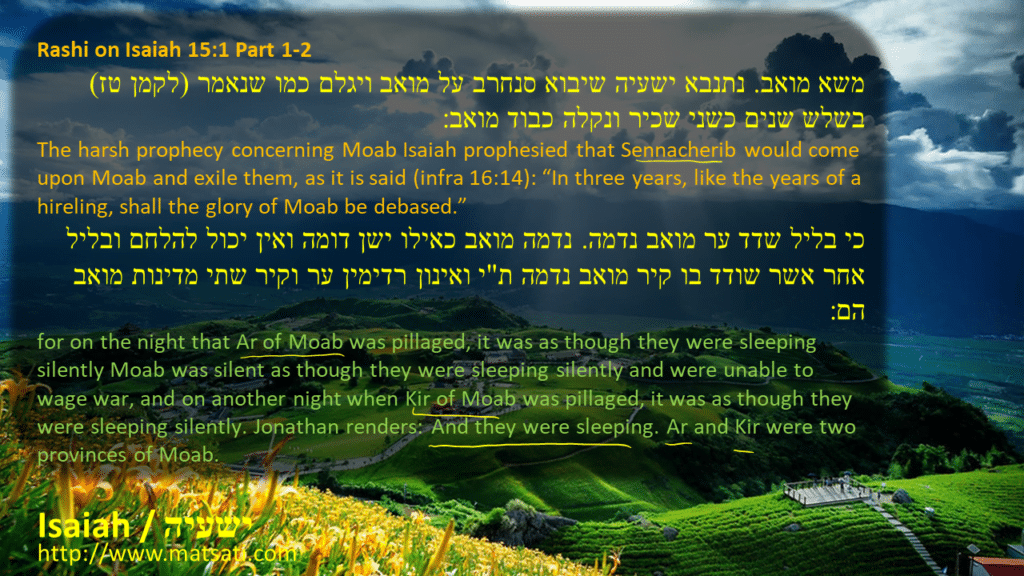
Rashi on Isaiah 15:1 Part 1-2
משא מואב. נתנבא ישעיה שיבוא סנחרב על מואב ויגלם כמו שנאמר (לקמן טז) בשלש שנים כשני שכיר ונקלה כבוד מואב: The harsh prophecy concerning Moab Isaiah prophesied that Sennacherib would come upon Moab and exile them, as it is said (infra 16:14): “In three years, like the years of a hireling, shall the glory of Moab be debased.”
כי בליל שדד ער מואב נדמה. נדמה מואב כאילו ישן דומה ואין יכול להלחם ובליל אחר אשר שודד בו קיר מואב נדמה ת”י ואינון רדימין ער וקיר שתי מדינות מואב הם: for on the night that Ar of Moab was pillaged, it was as though they were sleeping silently Moab was silent as though they were sleeping silently and were unable to wage war, and on another night when Kir of Moab was pillaged, it was as though they were sleeping silently. Jonathan renders: And they were sleeping. Ar and Kir were two provinces of Moab.
Rashi speaks of Sennacharib as the one who did the work of destroying Moab. Their men of war are described as though they were asleep and unable to wage war. This not knowing the hour, the time, or the moment of one’s destruction parallels something Yeshua said concerning not knowing the day or the hour of His return.
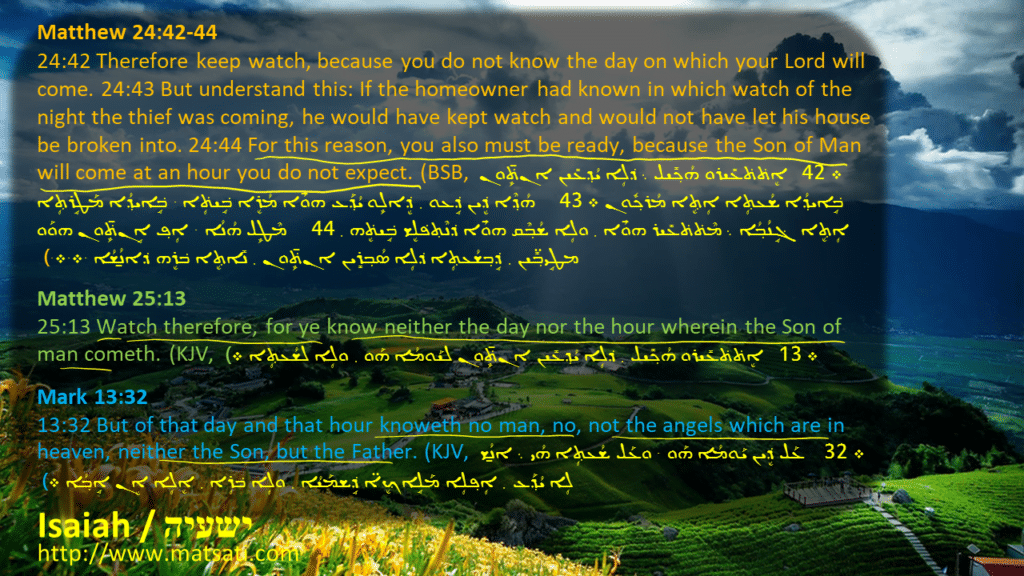
Matthew 24:42-44
24:42 Therefore keep watch, because you do not know the day on which your Lord will come. 24:43 But understand this: If the homeowner had known in which watch of the night the thief was coming, he would have kept watch and would not have let his house be broken into. 24:44 For this reason, you also must be ready, because the Son of Man will come at an hour you do not expect. (BSB, ܀ 42 ܐܷܬ݁ܬ݁ܥܺܝܪܘ ܗܳܟ݂ܺܝܠ ܆ ܕ݁ܠܴܐ ܝܳܕ݂ܥܺܝܢ ܐܢ̄ܬܾ݁ܘܢ ܒܱ݁ܐܝܕ݂ܳܐ ܫܳܥܬ݂ܴܐ ܐܴܬ݂ܷܐ ܡܳܪܟ݂ܽܘܢ ܀ 43 ܗܳܕ݂ܶܐ ܕܷ݁ܝܢ ܕܱ݁ܥܘ ܂ ܕܷ݁ܐܠܾܘ ܝܳܕ݂ܰܥ ܗ̄ܘܳܐ ܡܳܪܷܐ ܒܱ݁ܝܬܴ݁ܐ ܁ ܒܱ݁ܐܝܕ݂ܳܐ ܡܰܛܱܪܬ݂ܴܐ ܐܴܬ݂ܷܐ ܓܱ݁ܢܳܒ݂ܳܐ ܆ ܡܶܬ݁ܬ݁ܥܺܝܪ ܗ̄ܘܳܐ ܂ ܘܠܴܐ ܫܳܒ݂ܶܩ ܗ̄ܘܳܐ ܕ݁ܢܶܬ݂ܦ݁ܠܷܫ ܒܱ݁ܝܬܷ݁ܗ ܂ 44 ܡܶܛܾܠ ܗܳܢܳܐ ܁ ܐܴܦ݂ ܐܱܢ̄ܬܾ݁ܘܢ ܗܘܰܘ ܡܛܱܝ̈ܒ݂ܺܝܢ ܂ ܕܱ݁ܒ݂ܫܳܥܬ݂ܴܐ ܕ݁ܠܴܐ ܣܳܒ݂ܪܻܝܢ ܐܢ̄ܬܾ݁ܘܢ ܂ ܢܺܐܬ݂ܷܐ ܒ݁ܪܷܗ ܕ݁ܐ̱ܢܳܫܳܐ ܁܀܁܀܁)
Matthew 25:13
25:13 Watch therefore, for ye know neither the day nor the hour wherein the Son of man cometh. (KJV, ܀ 13 ܐܷܬ݁ܬ݁ܥܺܝܪܘ ܗܳܟ݂ܺܝܠ ܂ ܕ݁ܠܴܐ ܝܳܕ݂ܥܺܝܢ ܐܢ̄ܬܾ݁ܘܢ ܠܝܰܘܡܳܐ ܗܰܘ ܂ ܘܠܴܐ ܠܫܳܥܬ݂ܴܐ ܀)
Mark 13:32
13:32 But of that day and that hour knoweth no man, no, not the angels which are in heaven, neither the Son, but the Father. (KJV, ܀ 32 ܥܰܠ ܕܷ݁ܝܢ ܝܰܘܡܳܐ ܗܰܘ ܁ ܘܥܰܠ ܫܳܥܬ݂ܴܐ ܗܳܝ ܆ ܐ̱ܢܳܫ ܠܴܐ ܝܳܕ݂ܰܥ ܂ ܐܴܦ݂ܠܴܐ ܡܰܠܱܐܟ݂ܷ̈ܐ ܕܱ݁ܫܡܰܝܳܐ ܂ ܘܠܴܐ ܒ݁ܪܴܐ ܂ ܐܷܠܴܐ ܐܷܢ ܐܱܒ݂ܳܐ ܀)
This idea is as a thief in the night, as one who comes to take while the one being taken from is unaware. The Peshitta states, ܥܰܠ ܕܷ݁ܝܢ ܝܰܘܡܳܐ ܗܰܘ ܁ ܘܥܰܠ ܫܳܥܬ݂ܴܐ ܗܳܝ ܆ ܐ̱ܢܳܫ ܠܴܐ ܝܳܕ݂ܰܥ “upon the day and the hour man does not know” which is consistent with the idea of the visitation of the consequences of one’s sins. One does not know the day or hour when the mercy of God will run out from the sense allowing for repentance before destruction comes! What we are being taught is that we are called to repentance here and now. The hour is now to repent and turn from sin! The kind of destruction that comes to Moab the Targum describes in the following way. ב סַקוּ לְבָתַיָא דְדִיבֹון לְבָמָתָא לְמִבכֵי עַל נְבֹו וְעַל מֵידְבָא מֹואְבָאֵי מְיַלְלִין בְכָל רֵישֵיהֹון מְרַט כָל דְקַן גִילוּח׃ 15:2 They went up to the houses in Dibon, to the high place, to weep. Over Nebo, and over Medeba the Moabites are howling: on every head is baldness; every beard is shorn. ג בְשוּקֵיהֹון יֵיסְרוּן שַׂקִין עַל אִיגָרֵיהֹון וּבִרחֹובֵיהֹון כֻלְהֹון מְיַלְלִין מַצוְחִין וּבָכַן׃ 15:3 In their streets they shall gird themselves with sackcloth: on their house-tops, and in their broad-places all of them shall howl, crying and weeping. ד וּצוַחוּ יָתְבֵי חַשבֹון וְאַלעָלה עַד יַהַץ אִשתְמַע קָלְהֹון עַל כֵין מְזָרְזֵי מֹואָב מַצוְחִין עַל נַפשְהֹון מְיַלְלִין׃ 15:4 And the inhabitants of Heshbon and Elealeh shall cry out aloud; unto Jahats is their voice heard: therefore the armed of Moab are howling, and crying out aloud for their souls. ה בְלִיבְהֹון מֹואְבָאֵי יֵימְרוּן לְמִערַק עַד צֹעַר עַגלַת תַלתֹום רַבְתָא אְרֵי מַסֵיקִית לוּחִית כִיד בָכַן יִסְקוּן בֵיה אְרֵי בְמַחֹותִית חֹורֹונַיִם צִוחַת תְבִירֵי קְרָב יְבַסְרוּן׃ 15:5 The Moabites shall think to flee to Zoar, unto Eglath Tiltum Rabb’tha; for the ascent of Luhith they shall ascend it as with weeping; because in the descent of Horonaim they shall declare the cry of the broken in battle. (TgJ) The sectarian documents of the Dead Sea Scrolls state the following concerning the destruction of Moab in the section describing the eschatological war.
The War Scroll, 1QM, 4Q491–496
The description of the eschatological war.
Col. 1 1For the In[structor, the Rule of] the War. The first attack of the Sons of Light shall be undertaken against the forces of the Sons of Darkness, the army of Belial: the troops of Edom, Moab, the sons of Ammon, 2the [Amalekites,] Philistia and the troops of the Kittim of Assyria. Supporting them are those who have violated the covenant. The sons of Levi, the sons of Judah, and the sons of Benjamin, those exiled to the wilderness, shall fight against them 3with […] against all their troops, when the exiles of the Sons of Light return from the Wilderness of the Peoples to camp in the Wilderness of Jerusalem. Then after the battle they shall go up from that place 4a[nd the king of] the Kittim [shall enter] into Egypt. In his time he shall go forth with great wrath to do battle against the kings of the north, and in his anger he shall set out to destroy and eliminate the strength of 5I[srael. Then the]re shall be a time of salvation for the People of God, and time of dominion for all the men of His forces, and eternal annihilation for all the forces of Belial. There shall be g[reat] panic 6[among] the sons of Japheth, Assyria shall fall with no one to come to his aid, and the supremacy of the Kittim shall cease, that wickedness be overcome without a remnant. There shall be no survivors 7of [all Sons of] Darkness. 8Then [the Sons of Rig]hteousness shall shine to all ends of the world, continuing to shine forth until the end of the appointed seasons of darkness. Then at the time appointed by God, His great excellence shall shine for all the times of 9e[ternity;] for peace and blessing, glory and joy, and long life for all Sons of Light. On the day when the Kittim fall there shall be a battle and horrible carnage before the God of 10Israel, for it is a day appointed by Him from ancient times as a battle of annihilation for the Sons of Darkness. On that day the congregation of the gods and the congregation of men shall engage one another, resulting in great carnage. 11The Sons of Light and the forces of Darkness shall fight together to show the strength of God with the roar of a great multitude and the shout of gods and men; a day of disaster. It is a time of 12distress fo[r al]l the people who are redeemed by God. In all their afflictions none exists that is like it, hastening to its completion as an eternal redemption. On the day of their battle against the Kittim, 13they shall g[o forth for] carnage in battle. In three lots the Sons of Light shall stand firm so as to strike a blow at wickedness, and in three the army of Belial shall strengthen themselves so as to force the retreat of the forces 14[of Light. And when the] banners of the infantry cause their hearts to melt, then the might of God will strengthen the he[arts of the Sons of Light.] In the seventh lot the great hand of God shall overcome 15[Belial and al]l the angels of his dominion, and all the men of [his forces shall be destroyed forever.] (Michael O. Wise, Martin G. Abegg Jr., and Edward M. Cook, The Dead Sea Scrolls: A New Translation (New York: HarperOne, 2005), 147–148.)
We note that the armies of the sons of darkness, the army of Belial, includes Edom, Moab, Ammon, the Amalekites, Philistia, and the Kittim of Assyria. Note that the Kittim were believed to be the Romans, but here Kittim may be a more general term used to describe those from Assyria. This list of peoples are the surrounding nations who serve false gods and have led Israel to sin by worshiping their gods. Moab particularly worshiped the god Molech which involved the sacrifice of children. Note how the wicked will be destroyed without a remnant meaning that sin causes nothing to remain. It is interesting how these nations do not exist today. Israel however does exist, as God had promised His people! The DSS states “[the Sons of Rig]hteousness shall shine to all ends of the world, continuing to shine forth until the end of the appointed seasons of darkness. Then at the time appointed by God, His great excellence shall shine for all the times of 9e[ternity;] for peace and blessing, glory and joy, and long life for all Sons of Light.” This sounds very reminiscent of the book of Revelation. The idea is that the righteous will fight the wicked, this is an ongoing battle, a daily battle for the righteous. The DSS describes the forces of darkness prevailing over the sons of Light. Ultimately it is the Lord God by the might of His strength and His powerful and mighty hand that overcomes Belial, all the angles of Belial’s dominion, and all the men of his forces. The DSS connects the evil spiritual forces behind these evil men. Note the parallel to Paul in Ephesians 6 about the spiritual forces that are at work behind the scenes. Rashi states the following concerning these verses.
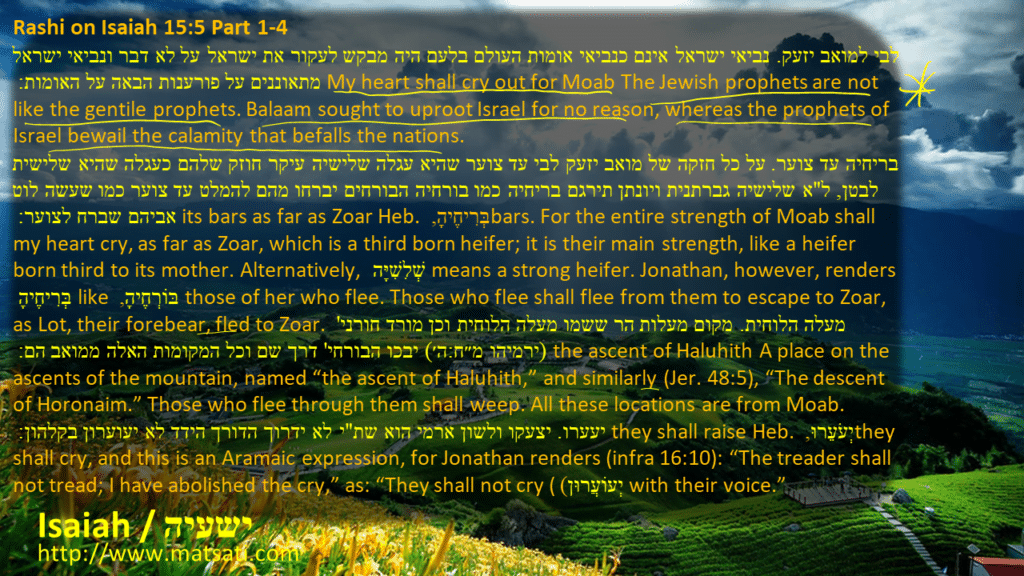
Rashi on Isaiah 15:5 Part 1-4
לבי למואב יזעק. נביאי ישראל אינם כנביאי אומות העולם בלעם היה מבקש לעקור את ישראל על לא דבר ונביאי ישראל מתאוננים על פורענות הבאה על האומות: My heart shall cry out for Moab The Jewish prophets are not like the gentile prophets. Balaam sought to uproot Israel for no reason, whereas the prophets of Israel bewail the calamity that befalls the nations.
בריחיה עד צוער. על כל חזקה של מואב יזעק לבי עד צוער שהיא עגלה שלישיה עיקר חוזק שלהם כעגלה שהיא שלישית לבטן, ל”א שלישיה גברתנית ויונתן תירגם בריחיה כמו בורחיה הבורחים יברחו מהם להמלט עד צוער כמו שעשה לוט אביהם שברח לצוער: its bars as far as Zoar Heb. בְּרִיחֶיהָ, bars. For the entire strength of Moab shall my heart cry, as far as Zoar, which is a third born heifer; it is their main strength, like a heifer born third to its mother. Alternatively, שְׁלִשִׁיָּה means a strong heifer. Jonathan, however, renders בְּרִיחֶיהָ like בּוֹרְחֶיהָ, those of her who flee. Those who flee shall flee from them to escape to Zoar, as Lot, their forebear, fled to Zoar. מעלה הלוחית. מקום מעלות הר ששמו מעלה הלוחית וכן מורד חורני’ (ירמיהו מ״ח:ה׳) יבכו הבורחי’ דרך שם וכל המקומות האלה ממואב הם: the ascent of Haluhith A place on the ascents of the mountain, named “the ascent of Haluhith,” and similarly (Jer. 48:5), “The descent of Horonaim.” Those who flee through them shall weep. All these locations are from Moab. יעערו. יצעקו ולשון ארמי הוא שת”י לא ידרוך הדורך הידד לא יעוערון בקלהון: they shall raise Heb. יְעֹעֵרוּ, they shall cry, and this is an Aramaic expression, for Jonathan renders (infra 16:10): “The treader shall not tread; I have abolished the cry,” as: “They shall not cry (יְעוֹעֲרוּן) with their voice.”
Rashi describes the differences between Jewish prophets and gentile prophets. Bilam was the one whom he chose to compare saying that Bilam chose to uproot Israel for absolutely no reason. When we read the story of Bilam, it appears that even money wouldn’t convince him to go against what the Lord had said. So why was it that Bilam eventually decided to go with the man of Balak? This is why Rashi describes Bilam as having no reasons but simply to curse for the purpose of uprooting a nation. Whereas, the prophets of Israel bewail the calamity that befalls a nation, regardless of which nation it is. The idea is the people will flee, they will weep, their fleeing will be both physically and spiritually. Their destruction will be final because they continue to seek their gods and not the God of Israel. The TgJ goes on saying the following, ו אְרֵי מֵי נִמרִים לְצָדוּ יְהֹון אְרֵי יְבֵיש עִסבָא סָף דִתאָה יָרֹוק לָא הְוָה׃ 15:6 For the waters of Nimrim shall become desolate; for the herbage is withered away; the grass faileth, there is no green herb. ז עַל כֵין שְאָר נִכסֵיהֹון דִקנֹו יִתבָזְזוּן וּתחוּמְהֹון עַל יַמָא מַערְבָאָה יִתנְסֵיב מִינְהֹון׃ 15:7 Therefore the remnant of their riches, shall be plundered; and their border, which is by the western sea, shall be taken from them. ח אְרֵי אַקֵיפַת צְוַחתָא יָת תְחוּם מֹואָב עַד אַגלַיִם מְיַלְלִין וּבאֵר אֵילִים מַצוְחִין׃ 15:8 For the cry encompasseth the border of Moab; unto Eglaim are they howling, and unto Beer-Elim they are crying aloud. ט אְרֵי מֵי דִימֹון אִתמְלִיאוּ דַם קְטִילִין אְרֵי אְמַנֵי עַל דִימֹון כִנֵישַת מַשרְייָן לְשֵיזָבַת מֹואָב מַלַך בְמַשרְיָתֵיה יִסַק לְמִבַז שְאָרָא דַאְרַעהֹון׃ 15:9 For the waters of Dimon shall be full of blood: for I will appoint upon Dimon an assembly of armies. Upon the escaped of Moab, a king with his army shall ascend; yea, to spoil the remainder of their land. (TgJ) The idea of the waters of Nimrim becoming bitter and the herbage and grass withering, these things may be analogous to the army of Moab having no strength due to their fear. Rashi writes in his commentary saying the following.
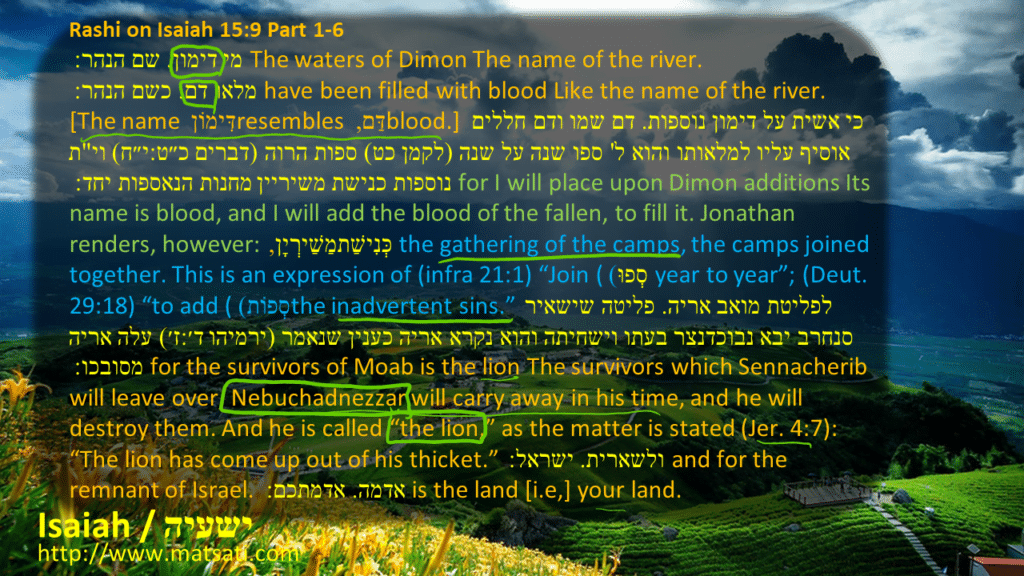
Rashi on Isaiah 15:9 Part 1-6
מי דימון. שם הנהר: The waters of Dimon The name of the river.
מלאו דם. כשם הנהר: have been filled with blood Like the name of the river. [The name דִּימוֹן resembles דַּם, blood.]
כי אשית על דימון נוספות. דם שמו ודם חללים אוסיף עליו למלאותו והוא ל’ ספו שנה על שנה (לקמן כט) ספות הרוה (דברים כ״ט:י״ח) וי”ת נוספות כנישת משיריין מחנות הנאספות יחד: for I will place upon Dimon additions Its name is blood, and I will add the blood of the fallen, to fill it. Jonathan renders, however: כְּנִישַׁתמַשַׁירְיָן, the gathering of the camps, the camps joined together. This is an expression of (infra 21:1) “Join (סְפוּ) year to year”; (Deut. 29:18) “to add (סְפוֹת) the inadvertent sins.”
לפליטת מואב אריה. פליטה שישאיר סנחרב יבא נבוכדנצר בעתו וישחיתה והוא נקרא אריה כענין שנאמר (ירמיהו ד׳:ז׳) עלה אריה מסובכו: for the survivors of Moab is the lion The survivors which Sennacherib will leave over, Nebuchadnezzar will carry away in his time, and he will destroy them. And he is called “the lion,” as the matter is stated (Jer. 4:7): “The lion has come up out of his thicket.”
ולשארית. ישראל: and for the remnant of Israel.
אדמה. אדמתכם: is the land [i.e,] your land.
Here Rashi speaks of the blood of the fallen according to Isaiah 15:9 and compares this to the Targum rendering as the gathering of the camps and the idea of inadvertent sins. Did you know that the Torah does not provide a sacrifice for “intentional” sin? This is how the Torah commands according to the book of Vayikra / Leviticus 5:1-3
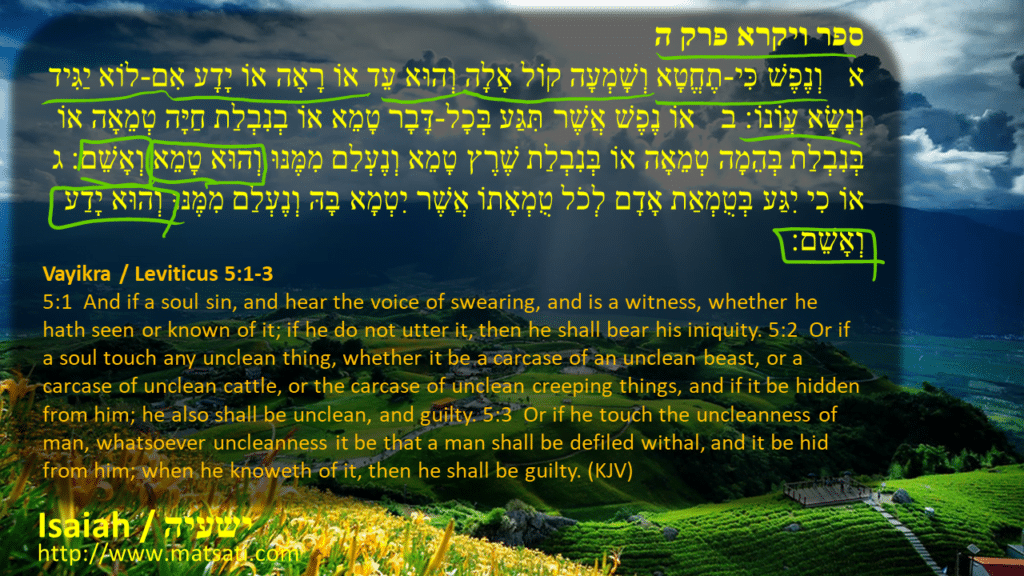
ספר ויקרא פרק ה
א וְנֶפֶשׁ כִּי-תֶחֱטָא וְשָׁמְעָה קוֹל אָלָה וְהוּא עֵד אוֹ רָאָה אוֹ יָדָע אִם-לוֹא יַגִּיד וְנָשָֹא עֲוֹנוֹ: ב אוֹ נֶפֶשׁ אֲשֶׁר תִּגַּע בְּכָל-דָּבָר טָמֵא אוֹ בְנִבְלַת חַיָּה טְמֵאָה אוֹ בְּנִבְלַת בְּהֵמָה טְמֵאָה אוֹ בְּנִבְלַת שֶׁרֶץ טָמֵא וְנֶעְלַם מִמֶּנּוּ וְהוּא טָמֵא וְאָשֵׁם: ג אוֹ כִי יִגַּע בְּטֻמְאַת אָדָם לְכֹל טֻמְאָתוֹ אֲשֶׁר יִטְמָא בָּהּ וְנֶעְלַם מִמֶּנּוּ וְהוּא יָדַע וְאָשֵׁם:
Vayikra / Leviticus 5:1-3
5:1 And if a soul sin, and hear the voice of swearing, and is a witness, whether he hath seen or known of it; if he do not utter it, then he shall bear his iniquity. 5:2 Or if a soul touch any unclean thing, whether it be a carcase of an unclean beast, or a carcase of unclean cattle, or the carcase of unclean creeping things, and if it be hidden from him; he also shall be unclean, and guilty. 5:3 Or if he touch the uncleanness of man, whatsoever uncleanness it be that a man shall be defiled withal, and it be hid from him; when he knoweth of it, then he shall be guilty. (KJV)
We note that according to the Torah, some sacrifices are voluntary, others are obligatory in nature such as in the case of the chatat (sin) offering. The nature of the sin offering is different depending upon the situation and is based upon the state at which one is in their life and relationship with God. Take for example, the leadership has a different sacrifice than the ordinary person, i.e. the Torat HaKohanim (Torah / Instruction of the Priests). The Torat of the priesthood involves the rituals and worship services that are performed by the priest in the Mishkhan (Tabernacle) which are different from the average lay-person. Rashi speaks of the inadvertent sins (Talmudic dictum from Talmud Bavli Sanhedrin 62b and Keritot 19b) in the areas of forbidden foods or sexual relations. The example may be that one reaches for kosher food and accidently takes non-kosher food and puts it in his mouth. The rabbinic ruling is that one must bring a korban chatat because “he received pleasure” even though other sins would be exempt from a korban in this case. The basic principles that are being taught here are that when a person lacks the conscious state of mind associated with the act of the sin. This means that one had no conscious or mental connection to the sin, this is the definition of “inadvertent sin” there is still the need for to bring a sacrifice. The reason these examples are required to bring a Chatat Korban is due to the involvement of pleasure since pleasure is a conscious state. What these things illustrate for us today is in relation to our bodies being the temple of God, the dwelling place of the Holy Spirit of God. This is the Torah centric principle of God dwelling in our midst. And the question of “Do we really believe that our bodies are the Temple of God?” Take for example, when one sins, one simply shrugs one’s shoulders and says “I made a mistake” and then moves on without another thought or repentance. This is doing a disservice to ourselves and to what the scriptures say concerning the house of God, our bodies. This speaks to one failing to properly examine the reasons for the error and failing to take care again. The Lack of mindfulness leads to habitual sin. There is also the lack of the recognition of the need for mindfulness that multiplies the possibility of repetition of sin and this leads again to the question “Do we really believe our bodies are the Temple of God?” How important is it in our relationship with God to acknowledge sin, even the inadvertent error that one may make? There is always the tendency to cut corners and skip the time it takes to take a moment to recognize the sin and admit to God and to whomever else it was we have sinned against that we have done wrong violating God’s Holy Word. These things remind us how important it is to be mindful of our actions, both individually and as a community. And especially who we are in the Messiah as the children of God and as the dwelling place of the Spirit of God. These things remind us of our ongoing relationship with God. This is why we daily pray over our food, blessing the food in the name of the Lord, this guides us to be mindful of who we are, and what we do. This is why Paul wrote what he did in Colossians 3:23 “And whatever you do, do it heartily, as to the Lord and not to men” (KJV, ὃ ἐὰν ποιῆτε, ἐκ ψυχῆς ἐργάζεσθε ὡς τῷ κυρίῳ καὶ οὐκ ἀνθρώποις) We thank God for His mercies that He has shown us, especially in the giving of His Son Yeshua upon the cross for the forgiveness of sins! B”H
